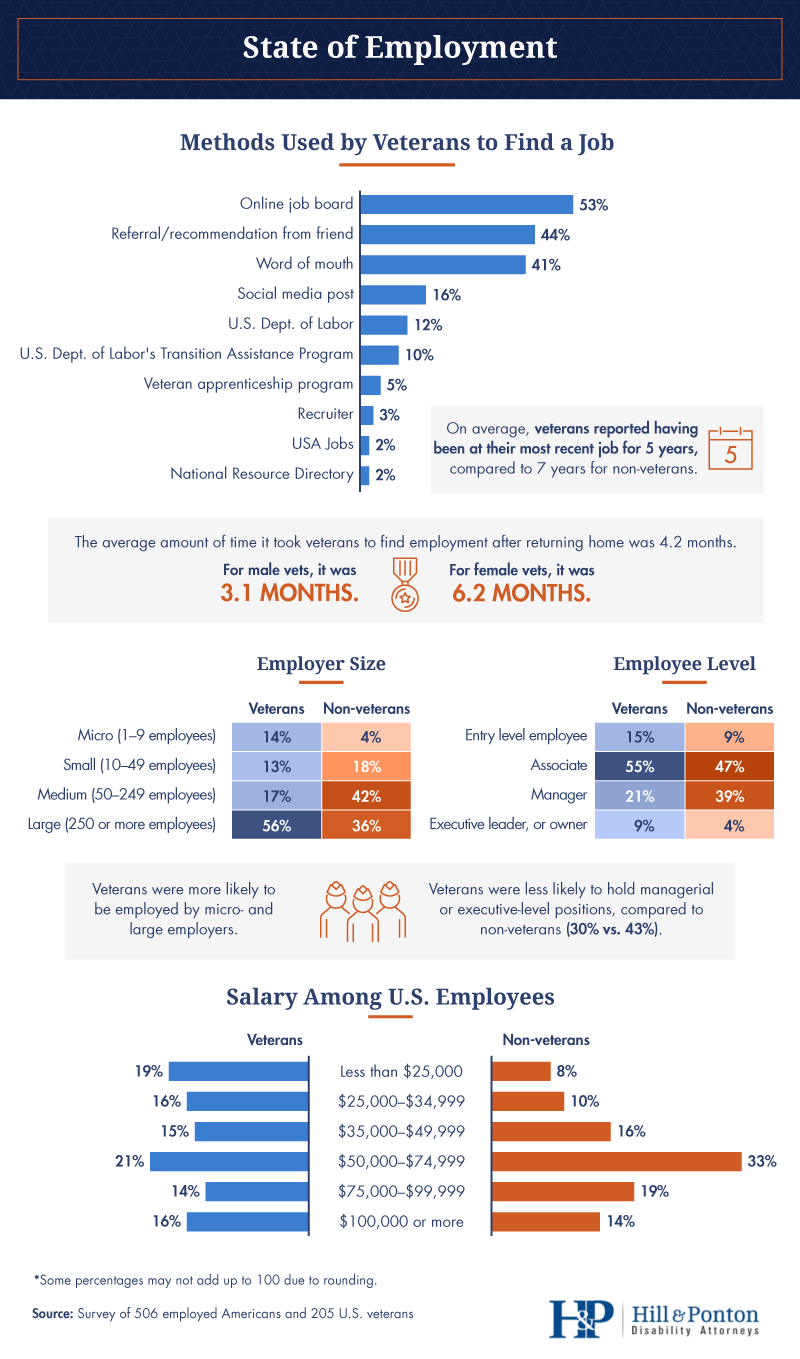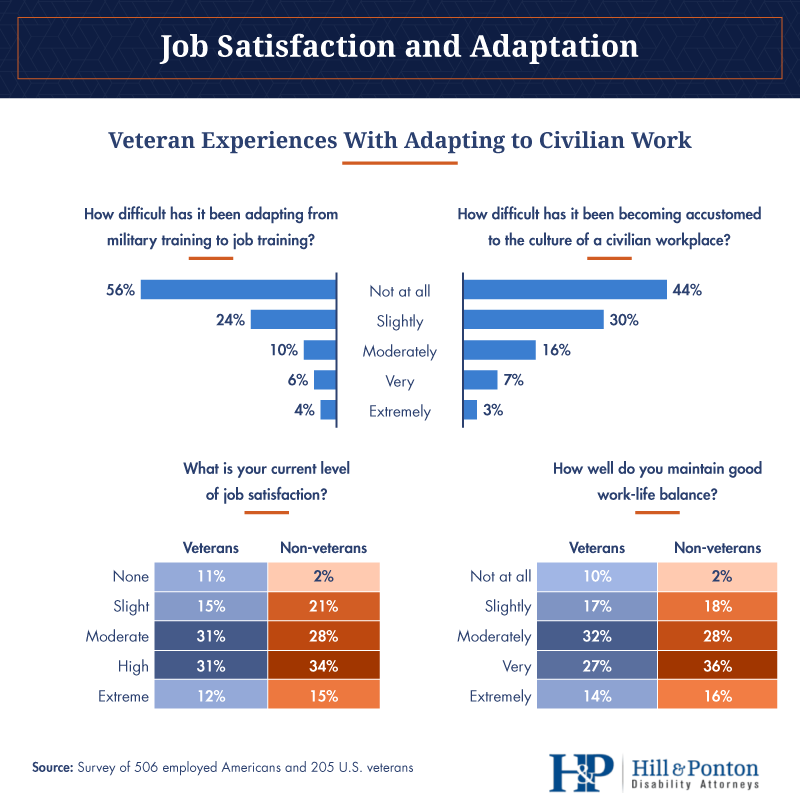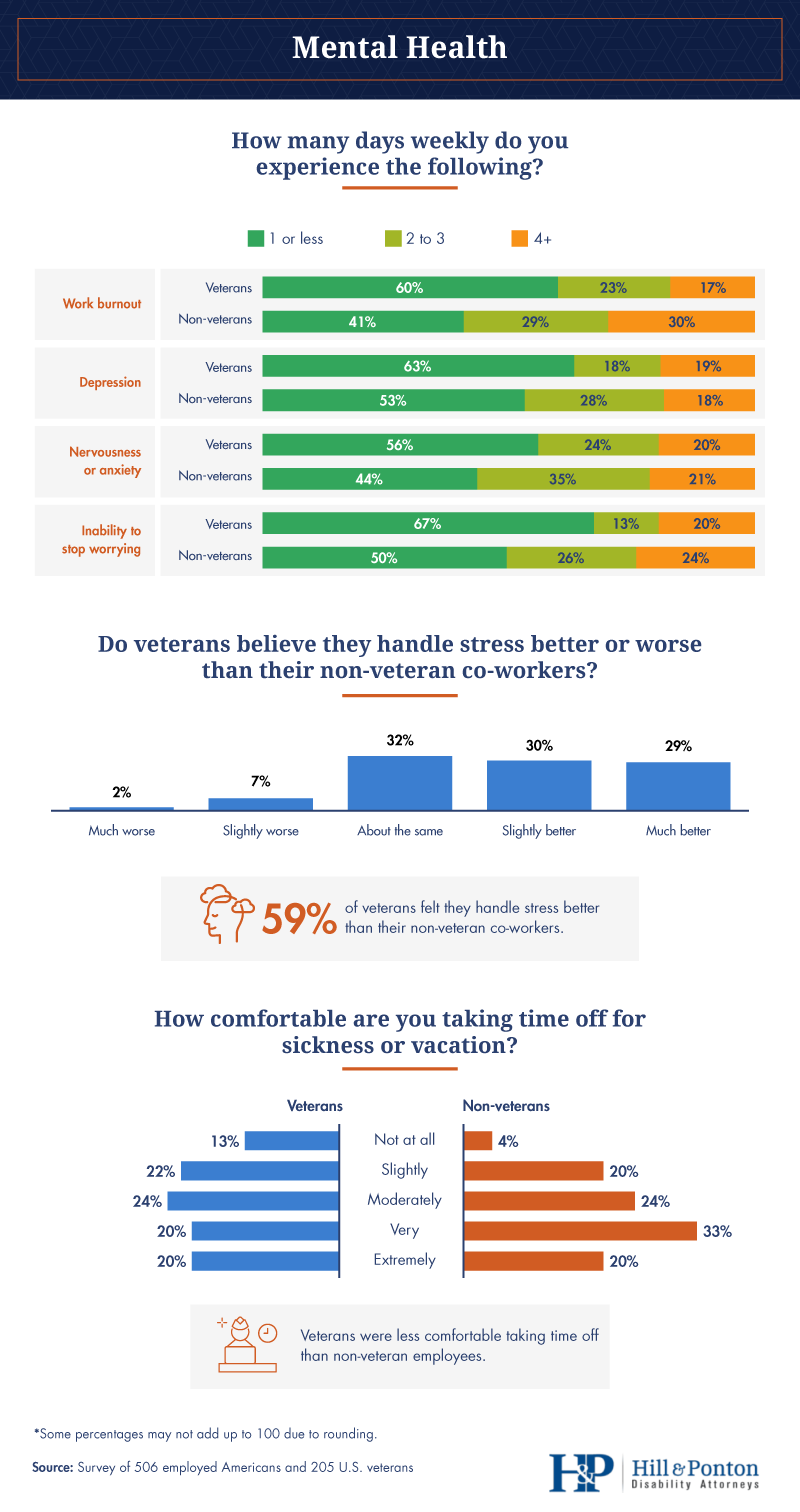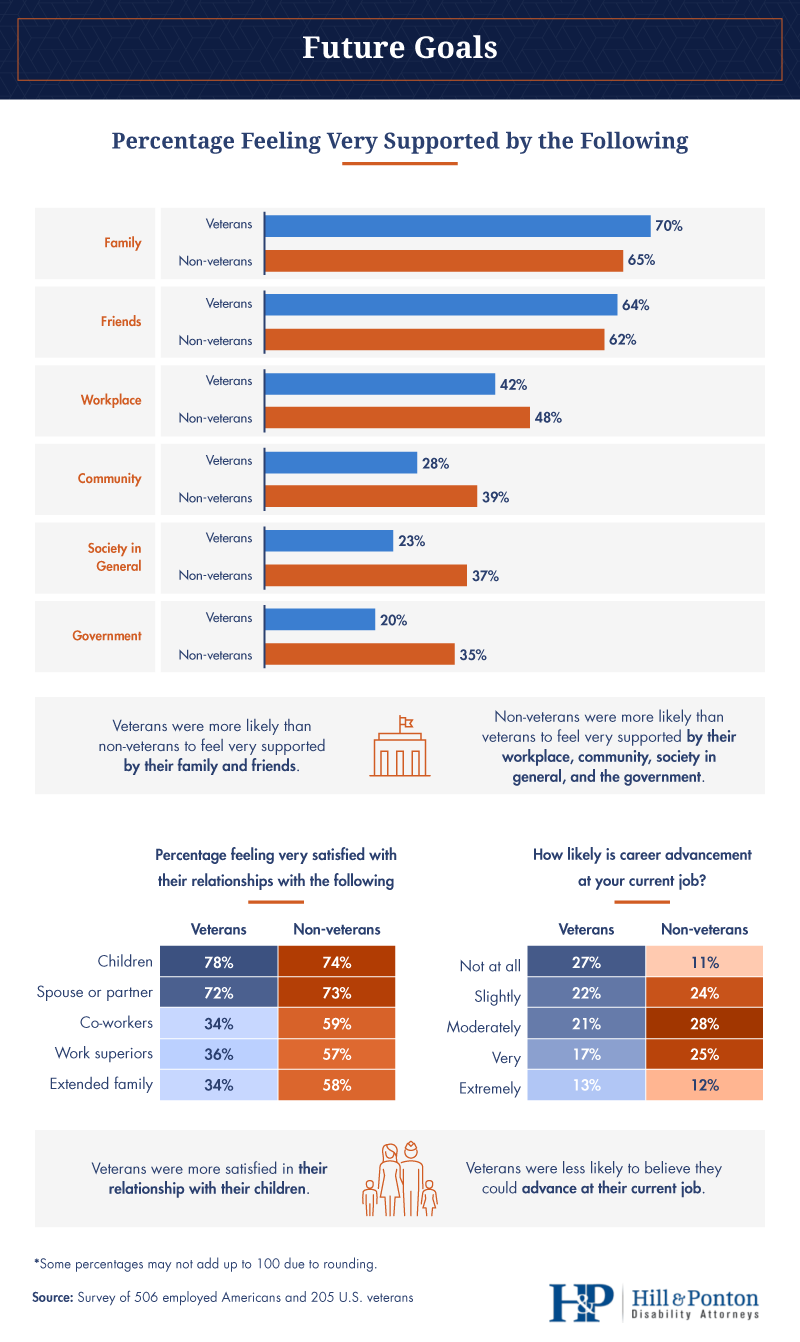
From Military to Civilian Careers
Transitioning from the military back into standard civilian life is a complex task. Of the necessary steps needed to get back into the swing of things, we wanted to focus on one in particular: employment. For this reason, we surveyed 506 employed Americans and 205 U.S. veterans to compare and contrast their experiences in the workplace.
We take a closer look at the different ways veterans find jobs once they’ve completed their service, as well as the microenvironments where they get hired (e.g., salary, company size, and employment level). Also, how have veterans fared in making the jump from a military job to a civilian one? How do their skills translate? Other aspects of veteran life will also be touched on, including taking a closer look at how accepting society is of former servicemen and women.
Key Takeaways:
- Veterans were more than twice as likely to be making a salary of less than $25,000 compared to non-veterans (19% vs. 8%)
- Veterans were more than five times more likely to report having no satisfaction at their current job than non-veterans.
- Veterans were less likely than non-veterans to experience work burnout, depression, anxiety, and an inability to stop worrying throughout the week.
- More than 1 in 4 veterans believed it was not at all likely for them to advance at their current job.
On the Hunt
When reentering the workforce, the best place to look for employment is via job boards, according to over half of our respondents. The internet is an especially helpful tool for accessing these job boards, with recruitment websites like military.com, recruitmilitary.com, and veteranjoblistings.com all doing their part to help veterans take the next step in their work life. Over 40% of respondents also relied on recommendations from friends and family, as well as word-of-mouth tactics to secure employment. It took veterans just over four months, on average, to get hired somewhere when they returned home, although men spent half as much time looking for jobs as female vets.

Also, while non-veteran respondents worked primarily at midsize or large companies, the majority of veterans worked exclusively at large ones. Regarding employee level, both groups had the highest numbers working in associate positions at said companies.
The veteran salary distribution was quite even among jobs paying less than $25,000 up to more than $100,000, while the greatest percentage of non-veterans (33%) were paid within the $50,000 to $74,999 range.
Adjustment Period
When asked about the transition from their military lifestyle to a civilian work setting, most veterans had little difficulty maneuvering the switch. Over half had no difficulty acclimating to job training as opposed to military training – from their time in the line of duty, veterans have likely learned to problem solve effectively, have a strong work ethic, and remain organized and disciplined, among other factors that would contribute to their confidence in working a civilian job. Forty-four percent felt that the transition to a civilian workplace was also a breeze – perhaps because teamwork is the foundation of both military operations and company success, once again helping to make the transition less daunting for veterans entering civilian life.

When comparing job satisfaction levels between veterans and non-veterans, it seemed that vets were the most likely to be dissatisfied with their job, although nearly two-thirds reported being either moderately or very satisfied with them. A third of veterans also said they maintain their work-life balance moderately well, just one notch below non-veterans, 36% of whom were adept in maintaining this balance very well.
Trained for This
Veterans’ grit and toughness has also clearly had an impact on them being able to control their emotions throughout the week. While the majority of vets felt burned out, depressed, nervous or anxious, or unable to stop worrying just once a week, non-veterans tended to experience these negative emotions more frequently. Most veterans also believed that they handle stress either the same or better than their non-veteran co-workers. With many likely having dealt with high-stress situations in a military context, it makes sense that many ex-servicemen and women are more resilient and adaptive to stress in the workplace. For example, they likely have experience setting priorities, accomplishing missions, and adhering to strict schedules, meaning they aren’t as likely to succumb to pressure as their civilian counterparts.

Finally, while both veterans and non-veterans were comfortable taking time off for personal reasons, veterans were a little more hesitant, overall, to do so.
Whose Side Are You On?
Veterans felt the love from family and friends more so than non-veterans but didn’t feel as appreciated by their workplace and especially not by their community, government, or society in general. Military personnel can be given “other than honorable” discharges for a variety of reasons, some grave and some not. These former service members are often excluded from a multitude of VA benefits, and are more likely to become homeless or have substance abuse-related issues. More than 500,000 military veterans bear the OTH label preventing them from accessing the help they may need from the government.

Regarding their more intimate relationships, most veterans are happy with their dynamic with their children and partners. However, they also reported being less satisfied with their relationships with co-workers, work superiors, and extended family than non-veterans. Veterans also weren’t as optimistic about their ability to ascend through the ranks at their respective workplaces.
Proper Thanks Are in Order
When looking for jobs after their service, online job boards were the biggest help to veterans, but many also capitalized on recommendations from friends and family. When they did secure a job, veterans transitioned to a civilian workplace with ease and were generally satisfied with their work arrangements. Veterans also believed they handle stress better than non-veterans – and given their history working in an organized, disciplined, high-intensity environment, this checks out.
Unfortunately, even though veterans seem to be thriving in their new work environments, many don’t get the support and benefits they need, with some being neglected for unfair or complicated reasons. At Hill & Ponton, we believe that all veterans deserve fair compensation and peace of mind for their services. Come see how we can help you get the recognition that you are entitled to, today.
Methodology and Limitations
We collected 506 responses of employed Americans from Amazon Mechanical Turk and 205 responses of employed U.S. veterans from Prolific. Sixty percent of our participants identified as men, and 40% identified as women. Participants ranged in age from 21 to 77 with a mean of 39 and a standard deviation of 11.2. Those who reported no current employment or who failed an attention-check question were disqualified. It is possible that with more veteran participants, we could have gained a greater insight into this population.
The data we are presenting rely on self-report. There are many issues with self-reported data. These issues include, but are not limited to, the following: selective memory, telescoping, attribution, and exaggeration.
Fair Use Statement
If you know someone who might be interested in reading about our veterans’ transition into civilian work life, feel free to share this article with them. We just ask that you do so for noncommercial use only and to provide a link back to the original page so that our contributors can earn credit for their work.



